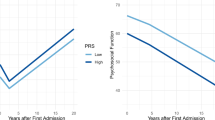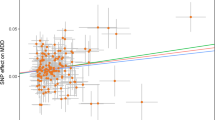Abstract
The overall risk for cancer among 19 856 parents of schizophrenic patients in Denmark was not increased; however, a 30% increased risk for lung cancer was observed in mothers (95% confidence interval, 1.03–1.61), suggesting an indirect effect on cancer risk mediated by life-style factors.
Similar content being viewed by others
Main
The belief that psychological stress causes cancer has a long history, but scientific evidence remains contradictory to date (Fox, 1995; Dalton et al, 2002). Psychological stress has effects on the endocrine and immune systems, which might enhance neoplastic growth by increasing the levels of corticosterone, prolactin or estrogen, or by decreasing the number and activity of lymphocytes and natural killer cells (Ader et al, 1995; Kiecolt-Glaser et al, 2002). Stress could also increase adverse life-style behaviours like smoking and heavy alcohol drinking, which over time increase cancer incidence (Smith and Gallo, 2000).
A son or daughter with severe mental illness, such as schizophrenia, is associated with significant grief, sorrow and feeling of loss constituting psychological distress among family members (Czuchta and McCay, 2001; Martens and Addington, 2001). We investigated the effect of the diagnosis of schizophrenia in a son or daughter as an indicator of psychological stress on overall and specific cancer incidence among their parents in a population-based study based on nationwide registers with complete and unbiased information on both exposure and outcomes of interest.
Materials and methods
From the nationwide Danish Central Population Register (CPR) we identified all 2 013 848 parents born in Denmark, alive on 1 April 1969 whose children were born after 1935 and were living between 1 April 1969 and 1 January 1983. Only parents whose children were over the age of 15 years at the termination of follow-up on 31 December 1997 were included since less than 1.5% of schizophrenia cases develop before that age (Westergaard et al, 1999). The CPR was established in 1968 and all residents of Denmark were assigned a unique identification number that permits accurate linkage between registries.
By linkage to the nationwide Danish Psychiatric Central Register, which contains information on all psychiatric admissions since 1969 (Munk-Joergensen and Mortensen, 1997), we identified and excluded 6676 parents who had been admitted for schizophrenia according to the International Classification of Diseases 8th revision between 1969 and 1993 (ICD-8, 295) and the 10th revision between 1993 and 1997 (ICD-10, F20; F25). Further, 10 466 offspring of the remaining parents were identified in the Danish Psychiatric Central Register with a diagnosis of schizophrenia; their parents constituted the exposed cohort.
We used the nationwide Danish Cancer Registry, which contains information on all cancer diagnosed in Denmark since 1943 coded according to a modified Danish version of the ICD-7 (Storm et al, 1997), to identify parents who developed a first primary cancer between 1 April 1969 or the day when the offspring reached 15 years (study entry), whichever date came last, and the date of a diagnosis of any cancer except nonmelanoma skin cancer, death, emigration or 31 December 1997, whichever date came first. Any diagnosis of nonmelanoma skin cancer was identified and counted, but did not lead to termination of follow-up, and a cancer occurring subsequently was counted as a first primary cancer.
The outcomes of interest were all first primary incident cancers, breast cancer, lung cancer and four subgroups of cancer hypothesised a priori to be associated with psychological stress: smoking-related cancers, alcohol-related cancers, virus- and immune-related cancers and hormone-related cancers.
The relative risk (RR) among parents with schizophrenic offspring relative to parents without schizophrenic offspring was estimated by log-linear Poisson regression with the GENMOD procedure in SAS 8.01. The RRs were calculated by sex, adjusted for age and calendar period (in 5-year categories) and number of children. All covariates were treated as time-dependent variables using the categories with the largest number of cases as the references. The parents were classified as exposed only from the date of schizophrenia diagnosis in the offspring and thus, parents contributed person-years at risk to the nonexposed group until schizophrenia is diagnosed in the offspring. From that date onwards the parents were contributing person-years as exposed.
Results
There were 19 856 parents in the exposed cohort and 1 979 216 parents in the unexposed cohort. The 1 999 072 cohort members had an average follow-up time of 24.2 years and contributed 48 343 429 person-years at risk.
The overall risk for cancer among parents whose offspring were diagnosed with schizophrenia was 1.00 (95% CI, 0.92–1.07) for fathers and 0.97 (95% CI, 0.89–1.05) for mothers (Table 1). For mothers the increased risk for all smoking-related cancers was carried by an increased risk for lung cancer of 1.30 (95% CI, 1.03–1.61) whereas the estimate for other smoking-related cancers combined was 0.97 (95% CI, 0.72–1.26). In fathers the risk for lung cancer was 0.87 (95% CI, 0.71–1.05) and for other smoking-related cancers combined was 1.00 (95% CI, 0.84–1.17). The maternal RR for breast cancer was 0.98 (95% CI, 0.84–1.15) and there was no excess risk for any of the groups of alcohol-, virus- and immune- or hormone-related cancers in either mothers or fathers.
Discussion
We found no evidence that schizophrenia in an offspring was associated with an increased risk of overall cancer in the parents. There was an excess risk for lung cancer in mothers to schizophrenic offspring but this was not observed in fathers.
Our study has the advantage of access to nationwide registries with complete coverage (Munk-Joergensen and Mortensen, 1997; Storm et al, 1997) which essentially eliminates recall and selection bias, loss to follow-up or misclassification of exposures or outcomes. We expected the chosen exposure would stress all parents, regardless of personality, coping style and social support or network. If there is a threshold effect for stress on cancer risk, we believe that the exposure is a strain of such level and duration that most of the exposed cohort members would be considered above this threshold.
Our study is in line with previous studies, suggesting that increased overall cancer risk attributable to stressful life events is small if any at all (McGee et al, 1996; Dalton et al, 2002). Further, the only association with cancer was observed in mothers of offspring with schizophrenia, who had an elevated risk for lung cancer. This finding may reflect a stress-induced increase in the amount smoked (Anda et al, 1990).
Taken together the evidence from this analysis provides no support for a direct effect of psychological stress on cancer aetiology.
Change history
16 November 2011
This paper was modified 12 months after initial publication to switch to Creative Commons licence terms, as noted at publication
References
Ader R, Cohen N, Felten D (1995) Psychoneuroimmunology: interaction between the nervous system and the immune system. Lancet 345: 99–103
Anda RF, Williamson DF, Escobedo LG, Mast EE, Giovino GA, Remington PL (1990) Depression and the dynamics of smoking. JAMA 264: 1541–1545
Czuchta DM, McCay E (2001) Help-seeking for parents of individuals experiencing a first episode of schizophrenia. Arch Psychiatr Nurs 15: 159–170
Dalton SO, Boesen EH, Ross L, Schapiro I, Johansen C (2002) Mind and cancer: do psychological factors cause cancer? Eur J Cancer 38: 1313–1323
Fox BH (1995) The role of psychological factors in cancer incidence and prognosis. Oncology 9: 245–253
Kiecolt-Glaser JK, McGuire L, Robles TF, Glaser R (2002) Psychoneuroimmunology: psychological influences on immune function and health. J Consult Clin Psychol 70: 537–547
Martens L, Addington J (2001) The psychological well-being of family members of individuals with schizophrenia. Soc Psychiatry Psychiatr Epidemiol 36: 128–133
McGee R, Williams S, Elwood M (1996) Are life events related to the onset of breast cancer? Psychol Med 26: 441–447
Munk-Joergensen P, Mortensen PB (1997) The Danish Psychiatric Central Register. Dan Med Bull 44: 82–84
Smith TW, Gallo LC (2000) Personality traits as risk factors for physical illness. In Handbook of Health Psychology, Baum A, Revenson T, Singer J (eds) pp 139–172. Lawrence Erlbaum: Hillsdale, New Jersey
Storm HH, Michelsen E, Clemmensen IH, Pihl J (1997) The Danish Cancer Registry: history, content, quality and use. Dan Med Bull 44: 535–539
Westergaard T, Mortensen PB, Pedersen CB, Wohlfahrt J, Melbye M (1999) Exposure to prenatal and childhood infections and the risk of schizophrenia. Arch Gen Psychiatry 56: 993–998
Acknowledgements
The study was supported financially by the Psychosocial Foundation (Grant 9922561) and the Stanley Medical Research Institute. The Danish National Research Foundation funds the National Centre for Register-based Research.
Author information
Authors and Affiliations
Corresponding author
Rights and permissions
From twelve months after its original publication, this work is licensed under the Creative Commons Attribution-NonCommercial-Share Alike 3.0 Unported License. To view a copy of this license, visit http://creativecommons.org/licenses/by-nc-sa/3.0/
About this article
Cite this article
Dalton, S., Laursen, T., Mortensen, P. et al. Major life event – diagnosis of schizophrenia in offspring and risk for cancer. Br J Cancer 90, 1364–1366 (2004). https://doi.org/10.1038/sj.bjc.6601695
Revised:
Accepted:
Published:
Issue Date:
DOI: https://doi.org/10.1038/sj.bjc.6601695
Keywords
This article is cited by
-
Stressful life events and cancer risk
British Journal of Cancer (2006)



